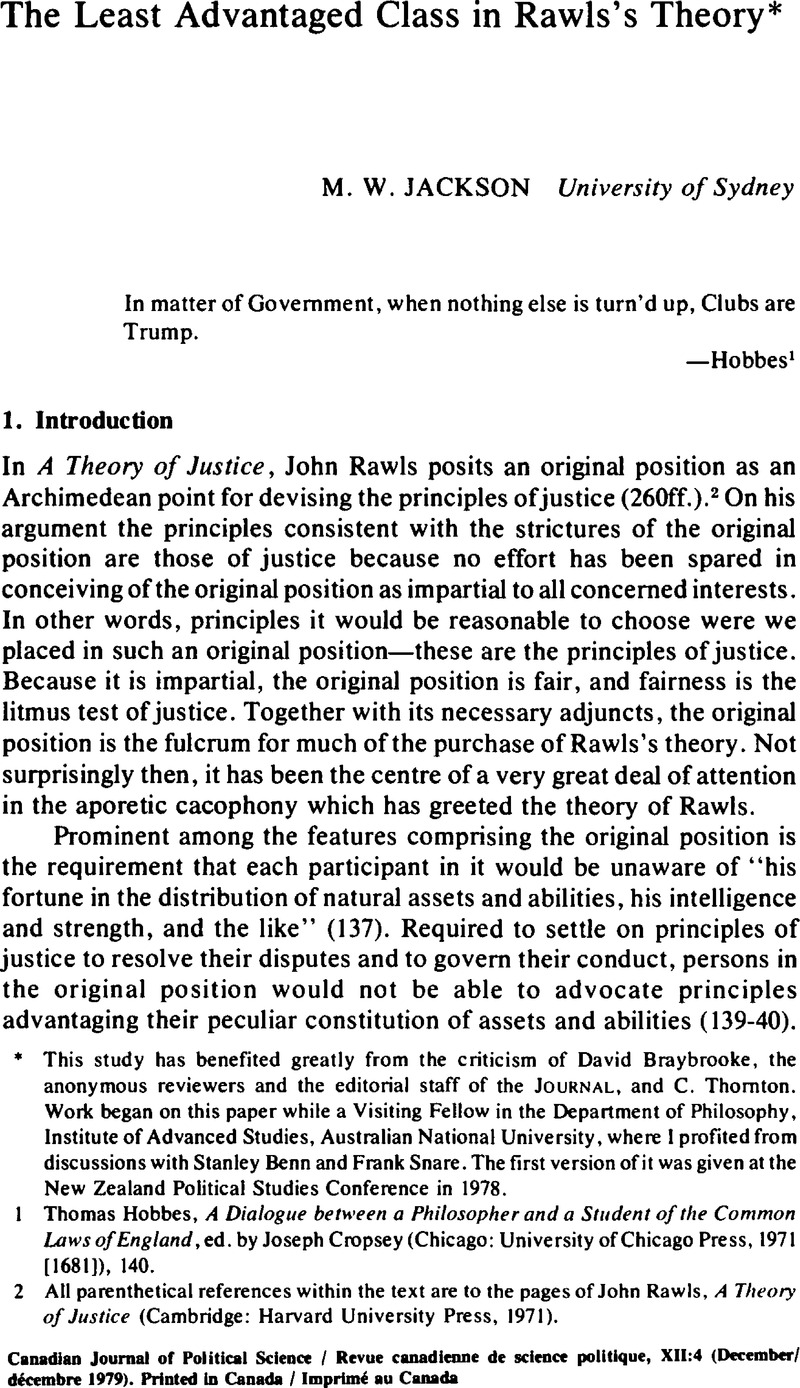Article contents
The Least Advantaged Class in Rawls's Theory*
Published online by Cambridge University Press: 10 November 2009
Abstract

- Type
- Articles
- Information
- Canadian Journal of Political Science/Revue canadienne de science politique , Volume 12 , Issue 4 , December 1979 , pp. 727 - 746
- Copyright
- Copyright © Canadian Political Science Association (l'Association canadienne de science politique) and/et la Société québécoise de science politique 1979
References
1 Hobbes, Thomas, A Dialogue between a Philosopher and a Student of the Common Laws of England, ed. by Cropsey, Joseph (Chicago: University of Chicago Press, 1971 [1681]), 140.Google Scholar
2 All parenthetical references within the text are to the pages of John Rawls, A Theory of Justice (Cambridge: Harvard University Press, 1971).Google Scholar
3 Barry, Brian, The Liberal Theory of Justice (New York: Oxford University Press, 1973), 109, 43.Google Scholar
4 Examples of writers concerned to unmask the least advantaged class include Dyke, V. Van, “Justice as Fairness: For Groups,” American Political Science Review 69 (1975), 607–14CrossRefGoogle Scholar, who suggests linguistic minorities for the part; Phelps, E., “Taxation of Wage Income for Economic Justice,” Quarterly Journal of Economics 87 (1973), 331–54CrossRefGoogle Scholar, who suggests those incapable of earning a living; Shue, H., “Liberty and Self-Respect,” Ethics 85 (1975), 195–203CrossRefGoogle Scholar, who casts those who cannot express their talents according to the Aristotelian Principle; Demarco, J., “Some Problems in Rawls,” Philosophy in Context 2 (1973), 41–48CrossRefGoogle Scholar, who ponders status as the key; Harsanyi, J., “Can the Maximin Principle Serve as a Basis for Morality?” American Political Science Review 69 (1975), 594–606CrossRefGoogle Scholar, who suggests health as a factor; Kavka, G., “Rawls on Average and Total Utility,” Philosophical Studies 27 (1975), 237–54CrossRefGoogle Scholar, who suggests possible persons who might not exist undercertain policies; and Parekh, B., “Reflections on Rawls's Theory of Justice,” Political Studies 20 (1972), 479–83Google Scholar, who wonders how specific the identity should be.
5 Rawls, , “Fairness to Goodness,” Philosophical Review 84 (1975), 540.CrossRefGoogle Scholar
6 For a more inclusive interpretation of the thin theory see Shue, H., “Justice, Rationality and Desire,” Southern Journal of Philosophy 13 (1975), 91–92ff.CrossRefGoogle Scholar
7 Bay, Christian, The Structure of Freedom (Palo Alto: Stanford University Press, 1957), 135Google Scholar. One obvious comparison would be Kant, Immanual, Metaphysical Elements of Justice (Indianapolis: Bobbs-Merrill, 1965), 37.Google Scholar
8 Bay, The Structure of Freedom, 92.
9 Ibid., 133, 103.
10 A similar observation is made by Fisk, M., “History and Reason in Rawls’ Moral Theory,” in Daniels, Norman(ed.), Reading Rawls (Oxford: Blackwell, 1975), 61–62.Google Scholar
11 See Nowell-Smith, P. H., “A Theory of Justice,” Philosophy of Social Science 3 (1973), 326.Google Scholar
12 Aristotle, Politics, Book V, Chap. 10.
13 J. Demarco, “Some Problems in Rawls,” 44.
14 Nagel, T., “Rawls on Justice,” Philosophical Review 82(1973),228CrossRefGoogle Scholar.Cf.Schaefer, D., “The ‘Sense’ and Non-Sense of Justice,” The Political Science Reviewer 3 (1973), 19ffGoogle Scholar. and Gourevitch, V., “Rawls on Justice,” Review of Metaphysics 28 (1975), 490ffGoogle Scholar. Intolerance is advocated as a relational good in the prominent examples of Robert Paul Wolff, “Beyond Tolerance,” and Herbert Marcuse, “Repressive Tolerance,” in Wolff, , Moore, B. Jr, and Marcuse, , A Critique of Repressive Tolerance (Boston: Beacon Press, 1965)Google Scholar. See the comments of Tinder, Glenn, Tolerance (Amherst: University of Massachusetts Press, 1976), 28–29.Google Scholar
15 Rawls, , “Fairness to Goodness,” Philosophical Review 84 (1975), 544.CrossRefGoogle Scholar
16 Konvitz, M., “Civil Disobedience and the Duty of Fair Play,” in Hook, Sidney (ed.), Law and Philosophy (New York: New York University Press, 1964), 28.Google Scholar
17 See Murphy, J., “Hume and Kant on the Social Contract,” Philosophical Studies 33 (1978), 76–77.CrossRefGoogle Scholar
18 See King, Preston, Toleration (London: Allen and Unwin, 1976), 76 and passim.Google Scholar
19 Ibid.
20 See Teitelman, M., “The Limits of Individualism,” Journal of Philosophy 69 (1972), 550CrossRefGoogle Scholar and Campbell, R., “Review of John Rawls, A Theory of Justice,” Dalhousie Law Journal 1 (1973), 217.Google Scholar
- 1
- Cited by




